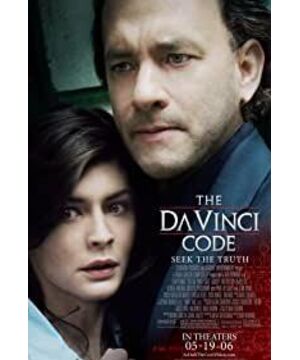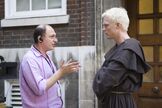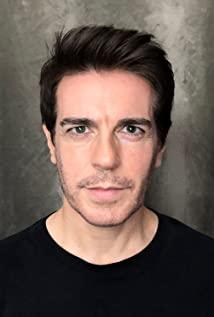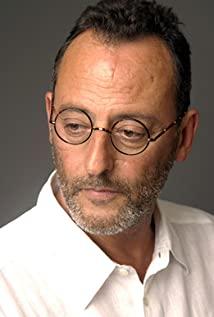I read the original a long time ago, before the film adaptation, when Dan Brown's "The Da Vinci Code" was a bestseller, and then read several Dan Brown novels in a row. I have to say that these novels are very charming, revealing the truth is very appealing, and getting all kinds of historical knowledge in them is also a kind of fun. Among Dan Brown's novels, this "The Da Vinci Code" is naturally the most exciting, and the later "Angels and Demons" is worse. The movie version of "The Da Vinci Code" is more enjoyable than "Angels and Demons". "Angels and Demons" is more likely to be made into such a feature film, with a tight plot and strong logic. But "The Da Vinci Code" is different. The plot of the novel is extremely compact, while the plot of the movie is so protracted. The intellectuality that brought me the most pleasure in reading is weakened very thoroughly in the movie.
I saw the movie version of "Angels and Demons" a long time ago, but I haven't seen the earlier "The Da Vinci Code". I read the original book earlier, so I only remember very few episodes. But I think it's pretty good to watch this movie in this state. If I don't remember the ending, I will not lose the fun of watching the movie, and I can recall the content of the book while watching it.
Having said so many comparisons between the original and the movie, of course I still think that the movie is a success. I still agree with Ron Howard's treatment.
When reading "The Da Vinci Code", the greatest joy it brought me was the knowledge in it. The suspenseful material in the book is also very rich. It is a book that people can't pick up and put down. Dan Brown is also really a genius. His novels are full of religious and historical knowledge, but also mixed with mathematical logic. At the same time, there are strong suspense scenes. The thirst for knowledge that is constantly satisfied while reading and the search for truth that has not been satisfied. The psychological fusion of this has created this best-selling book all over the world.
It is indeed difficult to adapt a best-selling book to a film, and the text is very different from the film and television. Compared with this kind of story novel, the text can carry more, whether it is the historical and religious knowledge contained in it, or the layers of the plot. In the movie, this knowledge is just a few statements by Professor Robert Langdon and some explanations by Sir Teabing. For ordinary audiences, these knowledge are just bits and pieces. Those who have not read the original book can completely ignore this knowledge. , see the story as a mediocre, dull adventure film, not to mention the joys of knowledge.
As a pure adventure film, it lacks some really appetizing jokes. The 174-minute extended version I watched was really long. I remember when I was reading the book, I was shocked when the teacher's real identity appeared. This is due to the foreshadowing of most of the book, the continuous emergence of the role of teacher, constantly ruling and influencing the direction of the story, so that the effect is very good when the truth is revealed. But the film contains too few things, and the role of the teacher is still too little (maybe the screenwriter has worked hard enough), coupled with the dull story direction and protracted length, so that the most important role in the film is revealed. It didn't have the dramatic effect it should have. In the scene where the teacher is revealed, when Sir Teabing's servant Remy is talking to the teacher, the camera is always limited to Remy. I think the teacher has to wait until the confrontation with Langdon. Until the teacher Poison Remy, but the teacher appears again. It felt like the treatment didn't work at all, and there was absolutely no point in aiming the lens at Remy.
I may have talked too much about the comparison between the original and the movie, and also talked about a lot of deficiencies. But I still like this movie. Maybe I'm a certain group of people who have read the originals, or maybe I'm more European and interested in religious history. Whether literary works or film and television works can be considered art, art can easily be preconceived. My subjective feeling tells me that even though there are many deficiencies, the 174-minute viewing time is still very long, but the final presentation effect of this film, the atmosphere of literature and art, and the fragrance of religion, I still will not regret this nearly 3 hours of dedication.
Most of the plots in the book take place indoors, in churches, secret rooms, and museums. Therefore, the picture of the movie is also very dark, but religion is a big book, and history is a dusty darkness, so I still like this kind of dark and thick tones. But the fly in the ointment is that the film should focus more on these symbols, the uniqueness of these churches. Since the movie has pictures, it should use the advantages of pictures to tell the story, especially when the protagonist travels between Britain and France. These different churches, the Louvre Museum in Paris, can become nodes, become the core location for discovering clues, and become the key to connecting the plot. Strengthening the sense of substitution of these locations, perhaps such a long story will not be so dull, and at the same time, it will highlight the uniqueness of European culture and religion.
When the two went to Westminster Abbey to find Newton's tomb, history and the present intertwined, the church crowd in history, the smoke and gray of history, and even the scaffolding on one side of the tower of Westminster Abbey . This section is really awesome. The flashback of history, walking through the streets of Europe, entering the churches in Europe, for thousands of years, the only constant is these bricks, and history is the witness of this brick by brick.
Faith is an eternal topic. The same goes for The Da Vinci Code. The original author, Dan Brown, is a Christian himself, but he has written such a work that discusses the humanity and divinity of Jesus. I think this is truly rational belief, a belief that has a deep understanding of history and religion. Religion may persecute women and break out wars, but true religion does not.
View more about The Da Vinci Code reviews










